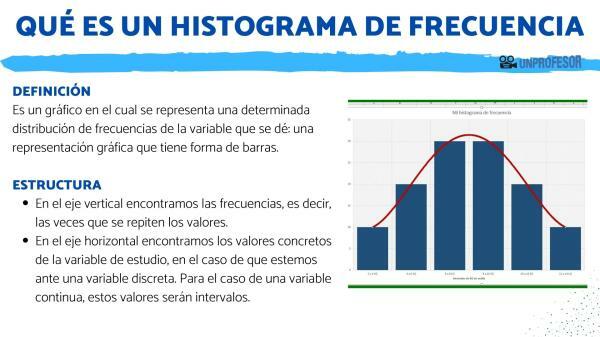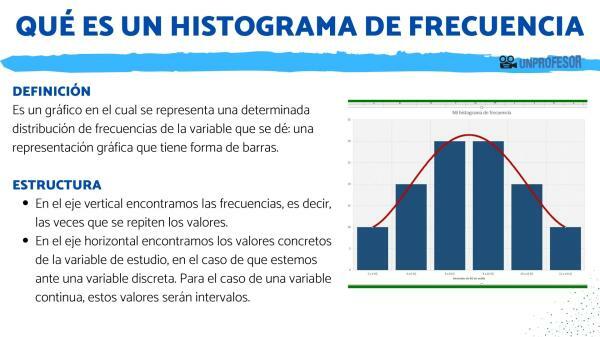What is a frequency HISTOGRAM

Today we are going to prepare a new lesson from a Teacher, this time about statistics. This lesson is about what is a frequency histogram and examples, so the first step will be to define what it is, in order to continue with the examples. At the end, we will see an exercise and its respective solution, to verify that what has been explained has been understood.
What we mean by histogram is that it is a chart in which a certain frequency distribution of the variable that occurs: that is, it is a graphic representation that has the form of bars. The surface of each of these bars is proportional to the number of times a represented value of the variable is repeated (frequency).
The structure of a frequency histogramis the next:
- On the vertical axis we find the frequencies, that is, the times the values are repeated.
- On the horizontal axis we find the values concretes of the study variable, in the event that we are dealing with a discrete variable. For the case of a continuous variable, these values will be intervals.
Continuous variable or discrete variable
But, What does it mean for a variable to be continuous or discrete? It's very simple: if the values can only be integers (for example, the number of children, which can be 0, 1, 2...) it is considered discreet, while if they can take any value (for example, salary, which can be €1026.89, €675.40...) it is a Continuous variable.
On numerous occasions, just at the top of each bar, the central end is marked with a dot, and then all the dots are joined (one for each bar).
We are now going to see how a frequency histogram is made through a couple of examples, one for the continuous variable and the other for the discrete variable.
Histogram of frequencies with discrete variable
Let us imagine that a survey is made to 10 people asking them for the number of smartphones they have and the results we get are: 1, 2, 1, 1, 1, 2, 0, 1, 1, 1. The first thing we need to do is organize this data into a frequency table. In a column we will put the possible values that, as you may have observed, are 0, 1 and 2. In the other column, we will put the frequency with which this value is repeated, like this:
ValuesFrequency
01
17
22
Now we can create our histogram, on the vertical axis we will put the frequencies and on the horizontal axis the values, as can be seen in the image below.
Continuous variable
If it turns out that we survey 10 people and their salaries are: 1005.38; 2100,52; 567,98; 848,82; 654,36; 1653,22; 1308,54; 1789,12; 762,95; 1234,33. As no number is repeated, what we would have is a frequency of 1 in each value, so it is better to group them in intervals of the same size, to have more information. A) Yes:
IntervalFrequency
(0,600]1
(600,1200]4
(1200,1800]4
(1800,2400]1
That is, there is 1 person who charges between 0 and 600, there are 4 people who charge between 600 and 1200, there are 4 people who charge between 1200 and 1800 and there is 1 person who charges between 1800 and 2400. So, we build the histogram:

We are going to practice what a frequency histogram is with the following exercises. Remember that below you have the solutions!
1. If the data from a survey on the number of siblings that the respondents have are the following: 2, 3, 2, 4, 1, 0, 2, 2, 3, 1, 1, 0. Reply:
- How many people have been surveyed?
- How many bars will the histogram have?
- What will be the maximum frequency at which the highest bar will arrive?
2. Classify these variables as discrete or continuous:
- Number of children
- Height
- Weight
- Number of students

